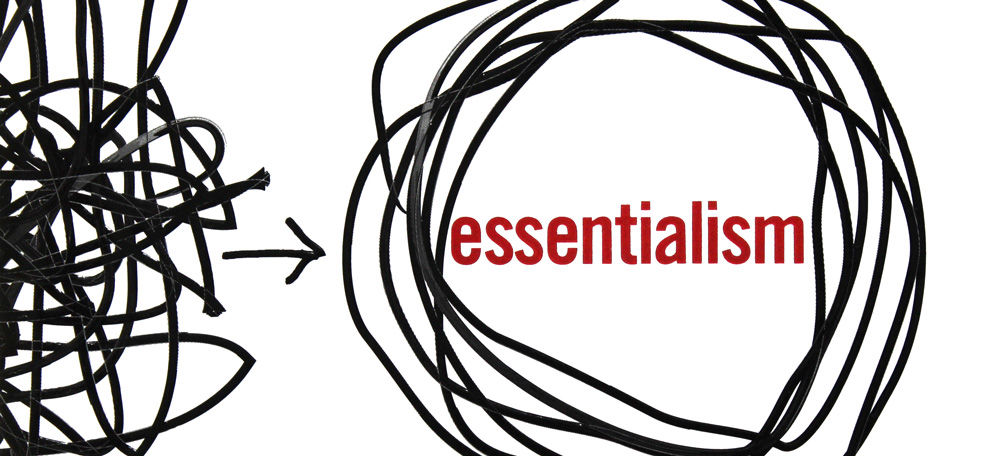onsider the main question that prefaces Essentialism : “Have you ever found yourself stretched too thin? Do you simultaneously feel overworked and underutilized?” Most of us would answer with a resounding “Yes!”, verifying the back-cover blurb by Wharton professor Adam Grant, who suggests that Greg McKeown’s book is “a timely, essential read for anyone who feels overcommitted, overloaded, or overworked—in other words, everyone.”
Still, Essentialism does more than just provide a soapbox to shout from. A potent antidote to that very specific 21st-century feeling of FOMO, or the fear of missing out, McKeown’s modern tome helps us say no. It helps us prune away everything that doesn’t contribute directly to our wellbeing and our success at work. It helps us identify the core driver of our happiness, along with the happiness of those around us.
But is it really possible, as Essentialism insists, to get more done in less time? Can we dispassionately apply disciplined thinking to our own lives, discerning what is absolutely essential (and then eliminating everything that is not) in the process? McKeown believes it’s possible, and backs up his arguments with insightful thinking from behavioral economists, management consultants, Silicon Valley CEOs—even Rosa Parks and Mohandas Gandhi.
Rather than “majoring in minor activities,” Essentialism lays out a concise plan for trimming the fat from everyday life. Below are a few of McKeown’s main points, all of which can serve as inspiration for those of us wanting to do less while accomplishing more.
1. Don’t just recognize the power of choice—celebrate it.
Discernment and patience are key; does the choice you’re presented with inspire you deeply? Does it meet a significant need in the world? Is it the most important thing you could be doing with the time and resources available? Consider the four E’s when making a choice: Explore the possibilities, Eliminate obstacles to decision making, Execute your decision with confidence, and make sure your choice aligns with the core Essence of who you are.
2. Give yourself room to play, sleep, look, read, and ultimately select.
Although these functions may seem trivial, they can also help you separate the trivial many from the vital few. Escaping the constraints of crowded calendars, constant communication, and the overwhelming pace of modern life can help you clear your mind and identify that big transformative idea. Don’t underestimate the power of creative expression, personal health, and mindfulness, all of which can help you “protect the asset” (that’s yourself) and achieve peak performance.
3. Eliminate distractions by embracing your inner editor, identifying essential intent, and embracing the freedom of boundaries.
McKeown endorses the idea of using explicit criteria to assess opportunities—in other words, if your measured and informed response to something isn’t a decisive yes, it should be a decisive no. With the strong internal clarity that results from such an exercise, we can differentiate between “multitasking” and “multifocusing” and erect boundaries that can be liberating and limits that can be limitless.
4. Effortlessly execute by expecting the unexpected, building up buffers, celebrating small wins, and focusing on what’s most important.
Extreme preparation may seem counterintuitive to the Essentialist life, but instead it allows us to remove obstacles and reduce friction in everyday life. As corporate leadership expert John C. Maxwell quips, “You cannot overestimate the unimportance of practically everything.” Subtracting can clear the unimportant from our pathway, delivering incremental progress that helps to build momentum in a meaningful way. Getting into a flow (or “The Genius of Routine,” as McKeown’s puts) can help us visualize success, while following the timeless concept of “Be here now” (yes, it extends from antiquity right up to modern-day Zen Buddhism) gives us the space to manifest happiness and maintain focus.
5. Think of Essentialism not as something you do but as something you are.
Whether you want to follow McKeown’s words to the letter or develop your own interpretation of Essentialism , think of it as a choice—your choice. By asserting more control over your life, you can savor the joy in the journey. What it really all comes down to is basic: before making a choice or deciding on a path forward, ask, “What is essential?” or “If I didn’t already have this opportunity, what would I be willing to do to acquire it?” Then, act accordingly, based on the inner clarity you’ve achieved.
McKeown finishes the book with a powerful quote from Indian activist Ela Bhatt: “When character is beautiful, you are beautiful. That is the beauty of simplicity.” Essentialism may not represent a cure-all for our modern struggles, and implementing many of its ideas requires considerable fortitude and self-discipline. But the book’s enlightening, empowering tone helps us hone in on what’s really important.
Nick McGregor
Being new is hard. Often for new faculty, it means adjusting to a new state, new team, new patients, and a new organizational culture. We asked hospitalists Ryan Murphy and Valerie Vaughn and surgeon Ellen Morrow for tips that only come from a little time under the belt.
After a year like none other, feeling inspired and motivated takes hard work. Interim Chief Operating Officer Alison Flynn Gaffney walks us through how to find and reignite inspiration and motivation.
What can happen when a pandemic meets medicine’s existing culture of overwork? Burnout. Pediatrician Diane Liu, radiologist Yoshimi Anzai, and family medicine physician Amy Locke provide three ways to re-engineer the workday to address clinician well-being during COVID-19 and beyond.
